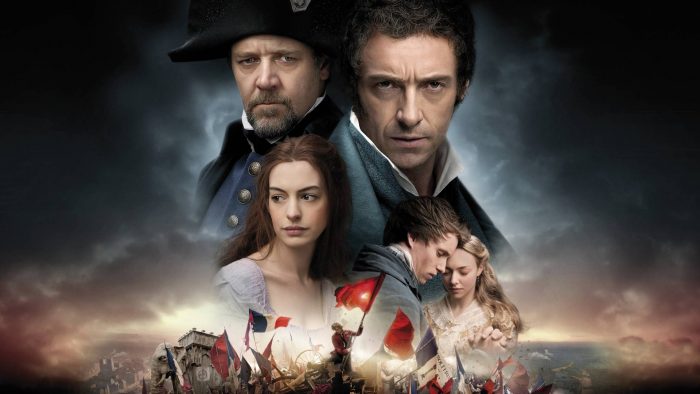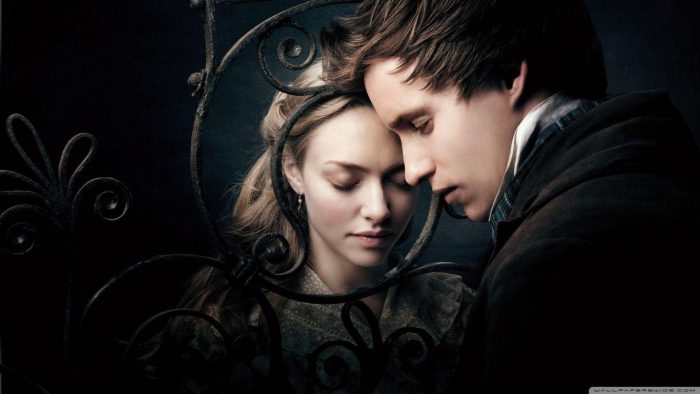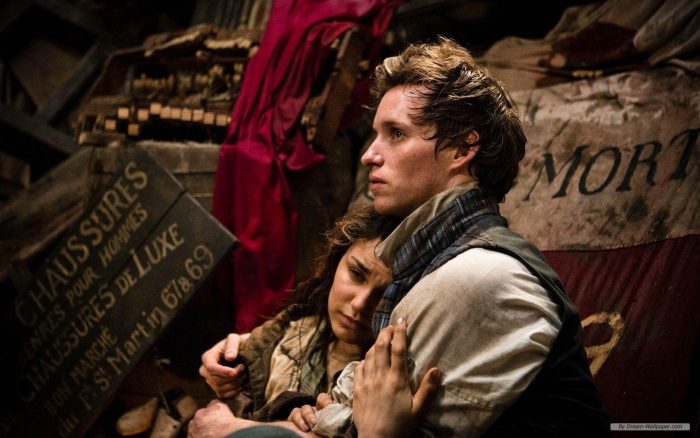Les Misérables: Book/Movie Review

Caution– this post contains spoilers for Les Misérables.
If you’ve been around me for the past month or so, you know that I’ve been reading Les Misérables by Victor Hugo. I checked out the book at the library and have been plowing through it bit by bit. The reason for this? I fell in love with the movie a while back, and when I heard there was a book, of course I had to read it. If I’d known sooner I probably would have read the book first. The book is a whopping 1200 pages. Yes, I just said that. TWELVE HUNDRED. And a few nights ago I finally finished it.
A few notes on the novel:
- It’s not the easiest read. It was originally published in 1862, written in French. Don’t get me wrong–it’s a beautiful book, full of detailed descriptions and deep reflections on human nature. But at the same time, there are a lot of long, rambling paragraphs. To be terribly (horribly, brutally) honest with you, I skimmed a few parts. (Don’t hurt, me, please…)
- The book is written in 5 parts, which are divided into shorter books, which are divided into chapters. At first they don’t seem connected at all (new characters are introduced periodically), but by the end they are all knit together into one plotline.
- If you get to the end of it, you’ll be glad you did. It’s a rich story. Worth all the seemingly random ramblings to get to the end.
Alrighty. Well, as I said, I finished the book a few nights ago. And the whole time I was reading it, I was thinking, I can’t wait to see the movie again. If you know me then you probably know that I really like the movie. Meaning, I’ve seen it 3 times, I listen to the soundtrack a lot, and my computer wallpaper often rotates between images of Marius, Jean Valjean, and Cosette. Last night I stayed up way too late watching Les Misérables in my bedroom, snuggled in my beanbag in the utter darkness with a cup of tea and a huge grin on my face.
Nota bene: When I talk about the movie, I’m talking about the 2012 adaption with Hugh Jackman, Russel Crowe, Amanda Seyfried, Samantha Barks, and Eddie Redmayne.
Thusly, it seemed fitting that I do my best to write a book/movie review for them. After the Little Women review I did way back when, I’ve been waiting to find another book/movie to examine. (And by the way, I realize now that my Little Women review isn’t the best thing I’ve ever written… I am hoping to re-doing it at some point.)
Now for the actual review. I’m going to compare some of the characters, and take a look at how they are different in the book versus the movie. And, I’m not going to give an entire synopsis of the plot, as that would make for an enormously long post (I mean, the book is 1200 pages long!) and I’m afraid I haven’t the gumption for that today.
Jean Valjean
I suppose you could call Valjean the main character of Les Mis, though technically, the book doesn’t start with Valjean. He doesn’t even make an appearance until page 71– Part one, book two, ‘the Outcast’.
Valjean is an ex-convict who has just been released from prison after 19 years. He was put there in the first place because he stole some bread for his nephew. He’s hunted as a fugitive by a man of the law, Inspector Javert.
I thought that the movie portrayed him very well, with one exception– they made him a bit younger in the movie. In the book, he’s middle aged at the beginning and in his eighties by the end. And if we’re discussing his appearance, the only difference is that Valjean has white hair. In fact, he’s known as ‘Monsieur LeBlanc’ by Marius for a long time.
After a pivotal moment early on in the story where a Bishop ‘purchases’ Valjean’s soul for God– Valjean is determined to show that same grace and compassion to others. He becomes an honest man, the mayor of a town and the owner of a wealthy business. He goes by the alias “Monsieur Madeleine”.
Valjean’s newfound grace and love shows when Cosette comes into his life, as a poor and abused child. Her mother, Fantine, has just died, and Valjean takes her in as his own child, despite being hunted as a refuge by Javert. Finally, he’s found someone to love. It becomes apparent nearer the end of the book, however, that his love for Cosette can almost be unhealthy at times. He’s hugely jealous of Marius when Cosette falls in love with him.
Despite his faults, though, he has a deep sense of spirituality that is refreshing and rich to read about.
Fantine
Fantine is a sad part of this story. If you’ve seen the movie, you know that she has the show-stopping song “I Dreamed A Dream” that is sure to have you bawling by the end.
Fantine starts out as an innocent young woman. However, she made some bad choices. She hangs around with people who don’t have her best interests in mind, and has a child with her lover only to be abandoned by him. The child is Cosette. Fantine, being poor, can’t support a child. She leaves Cosette with some seemingly nice innkeepers called the Thenardiers, and sets off to make enough money to one day take her back. However, the innkeepers are not nice. In fact, they are some of the nastiest people in the entire story. I won’t go into detail, but the gist of it is that Cosette is made into their slave. She’s sorely abused and traumatized by the Thenardiers, who care only about money. Fantine doesn’t know this.
When Fantine is kicked out of her job, she goes to desperate lengths to make money. She does some more awful stuff, feeling that it’s the only way to support Cosette. When it comes down to it, this is the Thenardier’s fault. They ask for money ‘for Cosette’ only to use it for other purposes while Cosette starves.
Eventually Fantine falls ill. Monsieur Madeleine (Valjean) comes to her and is with her when she dies, and he promises to care for the child Cosette when she dies.
As Fantine sings in the movie, summing up her existence:
“There was a time when love was blind
“I Dreamed a Dream” -Les Misérables (movie)
And the world was a song
And the song was exciting
There was a time…
Then it all went wrong.”
Cosette
I see Cosette as the main source of hope and light in this story. After being saved by Valjean, she is raised in a convent. She lives a simple life, satisfied with simple things. She has an eye for beauty. She loves her ‘father’, Valjean, dearly. (The confusing part about this, though, is that Valjean changes his name again to “Fauchelevent” when he adopts Cosette. So Cosette has no idea about the whole ex-convict thing.)
Cosette and her father have a habit of walking to a park and sitting on a bench every day for hours. It is there that they first encounter Marius. At first Marius takes no notice of them- Cosette is at the young, awkward age, and Marius doesn’t even bother to look at her. He walks by their bench every day for a long time, never really noticing the pair of them.
It isn’t until a year or so later that Marius walks by and stops to look twice. Is that the same girl? he thinks. For Cosette, in a single year, has blossomed into something extraordinary.
“It is the most commonplace of happenings. There comes a moment when the bud bursts overnight into flower and yesterday’s little girl becomes a woman to entrap our hearts. This one had not merely grown but was transformed.“
-Les Misérables, Victor Hugo
And that’s another thing that was really different between the book and movie– in the movie, it is literal love at first sight. Marius happens to see Cosette somewhere and instantly is head-over-heels in love with her. It’s actually kind of funny, now that I think about it.
In the book, however– he purposefully walks by their bench every day, wearing his best suit (to the confusion of his friends), hoping to catch a glimpse of the girl who’s stolen his heart.
“A single look and then I knew.”
-“A Heart Full of Love”, Les Misérables (movie).
And Cosette? She’s basically the same way. They make quite the pair.

Marius
Marius, I think, is the character who is represented least accurately in the movie. Okay, yes, I love him in the movie, but he’s very different than he is in the book.
In the movie, he’s shown as being a big part of the student’s revolt– a leader, in fact. You see him waving the red flag, rallying the people of France. But in the book– he’s more of a tagalong. His friends are really the ones behind it. It isn’t until the last minute that he decides to join, and that’s only because Cosette is going on a trip to Europe and he decides it would be better to die than live without her.
Another thing that isn’t mentioned in the movie is Marius’ father. Marius’ father was a soldier under Napoleon, and when he was terribly wounded, a man named Thenardier saved his life. (Yes, that Thenardier.) And so Marius is waiting his whole life to finally meet the man who saved his father’s life and pay any debt deemed necessary. His sense of honor is strong– he thinks it his life’s purpose to fine Thenardier and do whatever he wishes. This comes into the plot of the book in a climactic moment, but is left entirely out of the movie.
All in all, Marius is an honorable young man who loves Cosette and finds himself mixed up in a revolution.
Eponine
The next thing that’s vastly different between the two versions is Marius’ relationship with Eponine. For reference, Eponine is the daughter of the Thenardiers (yes, those Thenardiers), and Marius’ next-door neighbor in their apartment building.
In the movie, they seem to be friends, laughing and teasing one another. They get along pretty well. (Except for the fact that Eponine is secretly in love with Marius, who has no idea.)
In the book, though– Marius is basically disgusted by Eponine and her family. She’s the tall, lanky, dirty girl who follows him around. He tries to avoid her.
One thing worth mentioning, though, is that Eponine’s death scene is very similar to how it is in the book. (That’s where they sing their beautifully heart-wrenching duet, ‘Little Fall of Rain’.) Eponine dresses as a man and joins the fight at the barricade, and when she take a bullet to save Marius, she dies in his arms.
“And you will keep me safe
-Little Fall of Rain”, Les Miserables (movie)
And you will keep me close
And rain will make the flowers grow.”

Javert
Javert is a complex character. His defining quality is that he thirsts for justice. To him, justice is trump. He thinks it his duty to hunt down Valjean– and so he does, for several years. He’s relentless. He’s harsh. He’s ugly. But he is the law.
There’s a point in the story where Javert is captured and handed over to Valjean to be dealt with. And it’s at that point that both Valjean and Javert’s characters come into conflict– when Valjean shows mercy.
Javert is confused. Why would Valjean show mercy? Because to Javert, there is either justice or there isn’t.
Victor Hugo says of Javert in the novel:
“He was the guardian of order, the lightning of justice, the vengeance of society, the mailed fist of the absolute, and he was bathed in glory. There was in his victory a vestige of defiance and conflict.“
-Les Misérables, Victor Hugo
Yeah, Javert is kind of creepy. But in a strange way, you can sympathize with him. In his own eyes, he is the bringer of justice to mankind.
He has one song in the movie that is especially beautiful– “Stars”. It really gives an insight into his character. Behind his love for justice is a longing for God – and what is right. He looks at the bright stars in the night sky, and admires the order he sees in them.
His story ends when the conflict inside him is too much, and he throws himself off a bridge– a sad climax in the story.
“I am reaching but I fall
And the stars are black and cold
As I stare into the void
Of a world that cannot holdI’ll escape now from that world
-“Javert’s Suicide”, Les Misérables (movie)
From the world of Jean Valjean
There is nowhere I can turn
There is no way to go on.”
That’s enough about the characters– you get the idea. And my brain is swimming from flipping back and forth through the book and trying to remember which parts were movie and which were novel. Phew! And, doggone it, I haven’t even touched on the whole end of the story, with the barricade and Enjolras and Courfeyrac… Ah well, I shall have to be content.
For the overall story, here’s what I’ve got to say. It lives up to it’s name. Les Miserables means ‘The Miserable Ones’ or ‘The Outcasts’, which gives you a glimpse at what the story’s about. There’s a lot of sadness, a lot of crying, a lot of people who die. So, you’re thinking, is there anything good about it?
I’d say yes. Overall, there’s a strong message of God’s grace and redemption.
“Take my hand, I’ll lead you to salvation
Take my love, for love is everlasting
And remember the truth that once was spoken
To love another person is to see the face of God.”-“Epilogue”, Les Miserables (movie).
Overall rating: 9/10
Age recommendation: 13+
Well! There you have my freakishly long ‘review’ for Les Misérables!
.
image credits: https://wallpapercave.com/les-miserables-wallpapers
Wow beautifully said Abby!! I just finished the musical finally and I think I can say (with difficulty) that I love the story. It was so hard to listen to and I only read parts of it but in the end it shows the faithfulness of God from the perspective of several character types. In the end, there were the characters who blamed God and those who revered Him but it is clear that the world is the true evil force – it is the common (though somewhat hard to define) enemy, summed up in the name of Satan.
Loved listening to the soundtrack and reading this. Thank you Abby!!
Have you watched both the new and the old movies?
Nope, I’ve just seen the 2012 movie. I’d love to see others eventually, though.
After I read this review I went a read the book. I’m so happy I did. Thanks for introducing me to it. (:
Hey, that’s great! So glad you read and enjoyed it!
I watched and listened to the musical for YEARS before I saw the movie. And, to put it bluntly. I did not like the movie. I am not saying I hate it, but the singing does not compare at all to the Broadway musical.
And then we got a recording of the 10th? year anniversary of the musical, it had some of the old cast from the original musical singing and WOW! It is so good! I don’t mind the movie though, it helped me understand the story better, and then a few months ago I read the book. Yes, the movie takes out parts of the book, and changes pieces. But I think they did a good jo with it. I would recommend that you listen to or watch the musical, it’s super good!
Question, do you remember the priest at the beginning? Did you like his singing?
All in all, I love the story of les mis, and it’s my favorite musical.